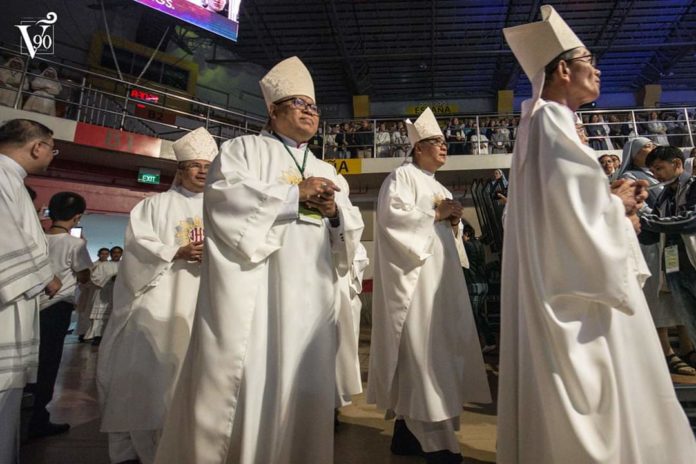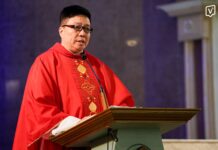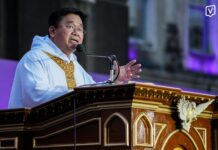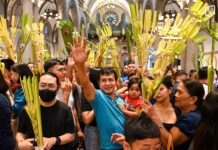THE CATHOLIC Church in the country played a huge role in the peaceful uprising in 1986 known as the People Power Revolution, which toppled the 21-year dictatorship of Ferdinand Marcos. Three decades later, Church officials are not keen on leading another one.
The first People Power revolution by millions of Filipinos who flocked to the Epifanio de los Santos Avenue, today known as EDSA, is considered as the first uprising that shed no blood and took no life, where people from all walks of life — including members of the clergy and religious, took part in.
In a statement after the 1986 snap elections rigged by electoral fraud and which proclaimed Marcos as the winner against Corazon Aquino, widow of Ninoy Aquino Jr., Marcos’ main critic, the late Cebu Archbishop Ricardo Cardinal Vidal called on “every loyal member of the Church, every community of the faithful, to form their judgment about the February 7 polls.”
“If such a government does not of itself freely correct the evil it has inflicted on the people then it is our serious moral obligation as a people to make it do so. We are not going to effect the change we seek by doing nothing, by sheer apathy. If we did nothing we would be party to our own destruction as a people. We would be jointly guilty with the perpetrators of the wrong we want righted,” Vidal, then president of the Catholic Bishops’ Conference of the Philippines (CBCP), said.
By Feb. 23, 1986, Sunday, crowds trooped to EDSA, responding to the call of Manila Archbishop Jaime Cardinal Sin through the Church-run Radio Veritas to support then rebel leaders Fidel Ramos and Juan Ponce Enrile who both broke ties with Marcos. Days later, the Marcoses fled the country.
Today, the Church’s role is to provide guidance and serve as a voice for the
people, but not as leaders of a revolution.
“If you’re looking at the [Church] leadership today, I don’t think there will be another EDSA revolution. [I]t happened because the support of the people was there. EDSA is a combination of people power and Church power. I think the bishops will just remain to be prophets meaning preachers of the word, shepherds that are against injustice,”
Fr. Jerome Secillano, executive secretary of the CBCP’s permanent committee on public affairs, told the Varsitarian in an interview.
Still, he said, the Church remains an institution in the country that the government listens to, despite attacks from President Duterte himself.
“The Church should somehow stand up and then try to go against the rising oppression, injustice. When [people] go to march and protest something, the government just shrugs them off. But look at how the Church is doing it. In fact, they are pissed off at the Church. So I think as an institution, [we can] well respond to all these [attacks] and at the same time thwart and stop it from proliferating,” Secillano added.
Caloocan Bishop Pablo Virgilio David, CBCP vice president, said EDSA only worked through “the impulse of the Holy Spirit,” and through instruments such as Cardinal Sin.
David, a staunch critic of the Duterte administration’s war against drugs, said Church leaders speak out from the “perspective of moral and spiritual leadership.”
“Our role is really spiritual and moral leadership, never political leadership. [W]hen we speak out about certain matters that may have political implications, we do so not as political leaders [but] from the perspective of our moral and spiritual leadership such as when we defend life, the dignity of people, the poor. It’s not politics, it’s basic morals,” he told the Varsitarian.
Novaliches Bishop Emeritus Teodoro Bacani said the Church only acts “in concert” to change an evil situation where there exists already a long-standing oppression of the people.
“Sometimes when abuses creep forth, the Church is also obliged in a special way to exercise a prophetic role of not only announcing the Good News but also denouncing evil,” Bacani said in an interview.
The prelate chided the President for his attacks on the Church, saying his behavior “goes beyond the bounds of civility.”
“The present president does not appear to always be sane. The way he speaks, it goes beyond the bounds of civility, not only of statesmanship but of simply pure civility. [T]he kabastusan is directed towards the Church, not only towards the bishops and the priests but the doctrines,” he said.
The country’s bishops broke their silence on Duterte’s tirades against the Church in a pastoral letter after their 118th plenary assembly last Jan. 28.
“We respect the freedom of conscience and religion of people of other faiths, including former Catholic Christians who may have already renounced their faith. We also respect the freedom of expression of our fellow citizens in this country, including their personal opinions about faith and religion. But as far as we know, the freedom of expression does not include a license to insult other people’s faith, especially our core beliefs,” they said.
The bishops added that, while they have no intention of meddling in state affairs, the mounting death toll on Duterte’s war on drugs cannot be ignored.
“But neither do we intend to abdicate our sacred mandate as shepherds to whom the Lord has entrusted his flock. We have a solemn duty to defend our flock, especially when they are attacked by wolves,” the bishops said.
Secillano said the Church serve as a moral guardian to the people and must speak out on issues affecting the nation that have a moral implication.
“It is not meddling with state affairs. All issues confronting the nation have moral aspects to them […] if the Church is going to be quiet about that, that’s tantamount to supporting in silence what’s happening in the country today,” Secillano said, referring to extrajudicial killings.
A report by the Philippine Drug Enforcement Agency in December of last year bared that the President’s “Tokhang” war had taken 5,050 lives since it began in July of 2016.
Lingayen-Dagupan Archbishop Socrates Villegas earlier this year reportedly said on radio he was worried more about the President’s health and his attitude toward the Church, noting that the Church has been around for 2,000 years and has gone through a lot.
Presidential spokesman Salvador Panelo, in response to Villegas, told Church leaders not to meddle with state affairs and the methods of the government for the good of the nation.
“The Church is only protecting the interest of the people, not our own personal interest. [I]t’s not politicking. [T]he Church is the protector of the people […] from those who would abuse them,” Secillano said, stressing that the Church was there to lend courage.
Secillano said Duterte was not the first to attack the Church.
Former president Benigno Aquino III said in his speech during Pope Francis’ visit to the Philippines that the Church “remained quiet” during the abuse of the Arroyo administration and “members of the clergy think that the way to be true to the faith means finding something to criticize.”
“It’s going to end soon. The people are already realizing the fact that we have a president who may have the political will,” Secillano said, “but he’s using that political will to thwart the Senate and it’s not healthy for a democratic country like us.” with reports from Joselle Czarina S. de la Cruz














